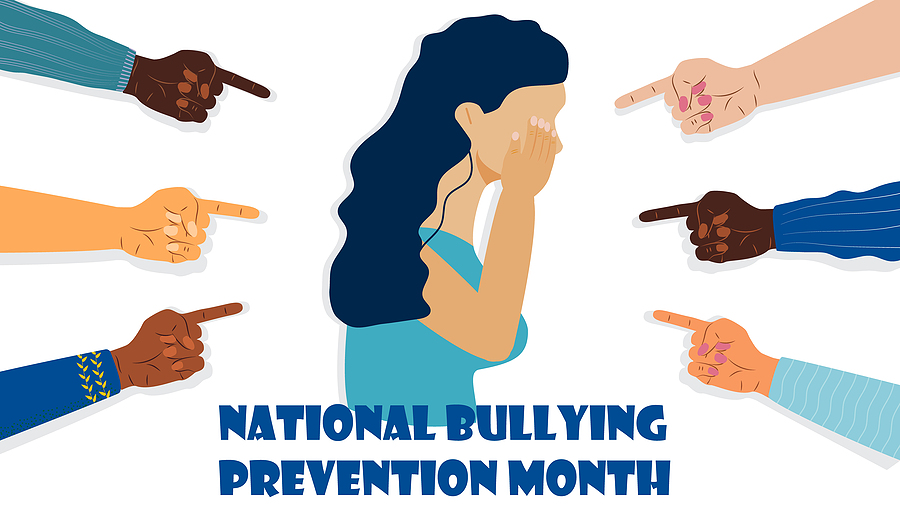October is National Bullying Prevention Month.

Jesse paused before walking into the school building. He breathed in deeply and felt a twinge of pain from his ribs, which still ached from the punches he received the day before. Ninth grade wasn’t supposed to be so tough, he thought.
Every day for the last two months, Jesse’s classmates found new ways to torment him. First, it was name-calling and other verbal taunts. Then, it was a series of pranks. For the last week, there had been a series of physical incidents—the worst of which had been yesterday. Things were getting worse for Jesse. He didn’t know how long he could endure it—or how to make it stop. He seriously entertained the thought of simply not going into the school building at all.
Jesse is a victim of bullying. And he isn’t alone. Studies show that one in five American students ages 12-18 experiences bullying[1]. 95% of those students report being bullied at school. And, we should note that bullying is not a problem only in secular schools. Like many other social problems, bullying exists in Christian schools, as well.
And bullying is a problem that has wide-ranging consequences for its victims. Data shows that victims of bullying are known to experience higher incidences of mental health and behavior problems than non-victims. Such outcomes might include depression, anxiety, sleep problems, low self-esteem, and even thoughts of self-harm and suicide. And those outcomes can last beyond adolescence. Into adulthood.
Victims of bullying are also at risk for lower academic achievement, dropping out of school, and social disengagement. The consequences are real. Students who are bullied pay a high price for the selfish and sinful behavior of others. Some of the emotional wounds suffered as the result of bullying last a lifetime.
In elementary and middle schools, I was bullied. I can still clearly recall some of those experiences. My teachers, parents, and school counselor all gave me the same advice: either ignore the bullying, or fight back. The few times I did fight back only succeeded in inflaming the situation, reaffirming my own powerlessness. And for those who have ever been victims of bullying, it is understood that ignoring the problem—either by victims or adults who are aware of the situation—only gives it permission to continue.
While on the surface it might appear that power is at the heart of bullying behavior, the opposite is actually true: fear and insecurity are at its core. Fear and insecurity on the parts of those who become bullies lead them to find security and identity by controlling others. Through humiliating others, they feel strong. Through doing so publicly (which is how bullying most frequently happens), bullies attract other insecure people to themselves. This both affirms the strength of the bully and allows the bully’s followers to live vicariously through his or her displays of power. In reality, though, it’s all an act. Bullies can only mask their own weakness and insecurity through frightening others.
This is why it’s necessary for teachers, parents, youth leaders, and other caring adults to identify when a student they love is being bullied, and to intervene. Only real power can defuse a bully’s bluster and end a cycle that will wind up only hurting innocent victims. How can you tell if a student is being bullied? Here are some things to look for:
- Students who suddenly seem withdrawn, depressed, or anxious
- Students who suddenly avoid school, church, or neighborhood venues that might be locations where bullying occurs
- Students who suddenly stop using social media or their phones altogether
- Students who have unexplained bodily injuries (bruises, scratches, etc.), torn clothes, or missing property
- Students whose eating habits suddenly change
- Students who engage in self-harming behaviors (cutting, eating disorders)
Sometimes, though, there may not be visible signs of bullying. Parents can be proactive in four ways to detect and stop bullying:
- Pray for your student, that the Lord would protect him or her from those who would wish to cause harm.
- Talk regularly with your student, asking diagnostic questions that might lead to bullying or other hidden problems being exposed. Ask about interactions with friends, about interactions with other peers, about how your student feels about him/herself. Ask him or her what’s currently making them happy and what’s making them sad or fearful.
- Watch your student and note how he or she interacts with peers. Can you see any visible or sudden changes? Does she suddenly seem more passive and shut down when with friends? Does he suddenly make excuses not to spend time with others?
- Monitor your student’s phone, social media, and app usage. About 37% of all bullying victims have been cyberbullied. Cyberbullying can take several forms: mean and hurtful comments about the victim, rumors about the victim, or threats of violence. Cyberbullying can be either direct (via text or instant messaging) or public (via social media). Cyberbullying is far from harmless, and must be stopped as soon as it is discovered.
What can you do as a parent or other responsible adult if you discover that your student is the victim of bullying?
- Pray and ask God for wisdom and discernment to deal with the situation.
- Talk with your student and affirm that you will make and keep them safe.
- Ask your student to share details with you about the bullying (Who? When? Where? What have they done? How long has it been going on? Who else knows?)
- If there has been violence or threats of violence, call the police.
- Elevate the situation immediately to other adults who can help shut down the bullying and hold the perpetrators accountable. This may include teachers, school counselors, and administrators if the situation occurs at school; youth leaders or pastors if the situation occurs at church; coaches if it occurs in a sports league. If appropriate, notify the bully’s parents or guardians and hold them responsible to intervene. Adults who know about bullying are responsible to stop the bullying.
- Continue talking with your student to determine how they are dealing with the situation and people involved. Determine where they might need additional assistance and interventions.
- Leverage the resources you have at your disposal. School counselors can connect your student with other resources, inside and outside of the school. Church leaders, particularly youth leaders, can provide spiritual care, encouragement, and a path toward healing. Counselors, social workers, and other therapists can provide emotional support and identify ways to create a climate of safety in which the student can begin to thrive.
Here are links to some other free resources you might find helpful:
Bullying in our schools and communities is never acceptable, it’s never normal, and it’s never harmless. Bullying winds up hurting us all. Let’s take steps to rein it in, and help students who have become victims to recover and thrive!
[1] Cited under “Bullying Statistics” heading of the webpage stopbullying.gov/resources/facts, last accessed 10/20/2020. Data was gleaned from studies by the National Center for Education Statistics and Bureau of Justice, and the Centers for Disease Control and Prevention.

Tim Geiger (M.Div.) is Executive Director of Children's Jubilee Fund. Born and raised in Philadelphia, Tim has lived in or around the city most of his life. His undergraduate studies done at the Community College of Philadelphia, Tim went on to earn a Master of Divinity Degree from Westminster Theological Seminary. He is ordained as a Teaching Elder in the Presbyterian Church in America. Prior to serving at Children's Jubilee Fund, Tim worked for the Internal Revenue Service, The Alliance of Confessing Evangelicals, and Harvest USA, where he also served as Executive Director and then President from 2012-2019. Tim lives with his wife and daughter just outside of Philadelphia.

Children's Jubilee Fund is a 501(c)(3) organization established in 1997 to provide tuition grants to Christian schools in the Philadelphia metro area that serve underprivileged students. These grants are then awarded by the schools as scholarships to students who meet income and residency guidelines. Each year, Jubilee provides hundreds of thousands of dollars in grants that, in turn, help hundreds of students in Philadelphia, Delaware, Montgomery, and Camden Counties achieve their God-given academic and personal potential. Children's Jubilee Fund is an entirely donor-supported organization.
